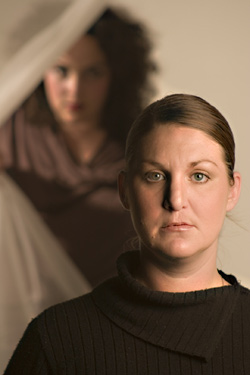It’s the rarest of events, the albino buffalo of theatrical productions: two stage companies, operating independently but nearly concurrently, producing Shakespeare plays with entirely female casts. What are the odds? It might be tempting to sound out some sort of cultural bellwether here, a harbinger of a coming wave of proto-feminist neoclassical reinterpretations of the Western canon. But no—this is merely a happy coincidence. On the one hand, there is Animus Theater Project and its “gender inversion” of Hamlet, with Erica Chiles- Curnutte (pictured) cast in the challenging lead role; and then there is upstart crow, a new company whose inaugural production will be an all-female staging of King John. If these productions have anything in common beyond their exclusion of males on the stage, it’s the insistence of those involved that such all-femaleness is not a statement in and of itself. While there are plenty of intriguing reasons for the decision to go unisex, those reasons are less political than artistic.
“We are not interrogating gender and sexuality,” says Animus Theater dramaturg Steve Roth. “Our goal really is to give these women the opportunity to do the greatest Hamlet they can do, and let that speak for itself.”
Explaining their decision to mount an all-female production of Shakespeare’s greatest play, Roth and director Ryan Brown, who met when Brown enrolled in a class Roth was teaching on Hamlet, go right to the source. Citing the famous graveyard scene, Roth argues that a pair of curious lines—one between Hamlet and the grave digger, and the other referring to Yorick’s skull—have led most readers, lay and professional alike, to assume that Hamlet is 30 years of age. “This is what got me sort of obsessed with Hamlet,” Roth says. “I felt that those two lines in the graveyard are insanely obtrusive. What are they doing there? They’re contradicted by everything else in the play.”
That “everything else,” Roth and Brown contend, points to Hamlet’s being a teenager—the wild indecisiveness, the desultory mood swings, the existential searching that leads to brash intellectual about-faces, sometimes midscene. “Everything about him screams teenager,” Roth says.
“We thought it a much richer choice to play Hamlet as a teenager,” Brown adds. “The problem with that is casting Hamlet as a young man. It’s incredibly difficult to find a young [male] actor who will have that emotional depth and range. I’ve worked with a lot of [young] male and female actors, and in my experience, female actors just have an emotional accessibility that male actors don’t often have.”
In the case of King John, the decision to do an all-female Shakespeare production came first, according to director Rosa Joshi, even before she’d chosen the particular play. “That idea came out of knowing there were a lot of talented women in town, and there are not a lot of opportunities for women to work together on classical plays,” she says. “We specifically wanted to choose a history play,” she adds, noting that Shakespeare’s historical dramas have “very rich resonances for contemporary politics, they’re very complex and engaging and entertaining plays, and they’re rarely done.”
Joshi says she’s interested in exploring the ways an all-female cast can examine character and behavior. Something that a man does onstage might be so commonplace that it is easily overlooked, but when a woman does the same thing, the audience sees the action anew. “I’m really interested in what kind of connections audiences make,” Joshi notes.
The play, she says, is not set in a particular period, though all the characters will be dressed in suits. “The visual world is sort of abstract and minimal,” Joshi says, “to emphasize theatricality and artifice.” What she doesn’t want is any sort of one-on-one correspondence with the present day; the play is not a stand-in for current political circumstances. “You’ve got to let the complexity of the piece speak for itself.”








